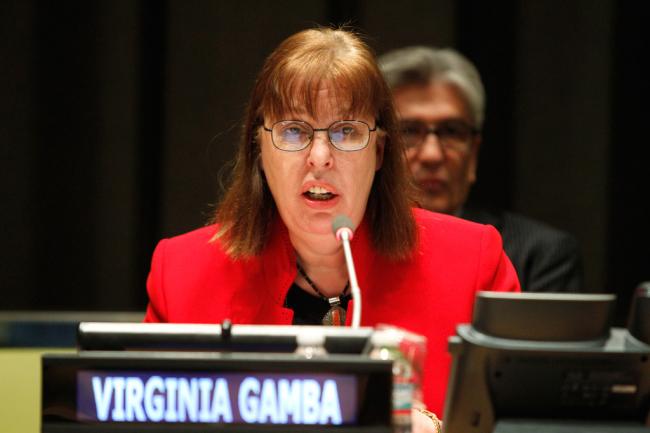
Syria: head of panel for joint UN body says chemical weapons probing to begin in March
After briefing a closed-door session of the Security Council at UN Headquarters in New York this morning on the first reportOPCW)-UN Joint Investigative Mechanism on Chemical Weapon Use in Syria, the head of the Mechanism’s leadership panel, Virginia Gamba, told reporters that the goal is to finalize the list of potential cases by the first week in March so that the investigation of the cases deemed as possibly leading to the identification of perpetrators can begin.
“I want to assure the individuals, groups, entities or governments that minimally are thinking in that direction, or have thought in that direction, that these acts will be identified and that they will be held accountable for their actions,” Gamba stressed.
Reaffirming the panel’s view that the use of toxic substances or weapons under any circumstances is “totally abhorrent,” Gamba said that the Mechanism’s report provides an overview of the investigation, the methodology behind its activities, and some information about the way forward.
According to the report, which covers the period from 24 September 2015 to 10 February 2016, the panel initially identified six potential cases for further investigation, while a seventh case was added during the briefing to the Security Council this morning, Gamba said.
Thus far, the identified potential cases include: Kafr Zita, Hama Governorate, 11 and 18 April 2014; Talmenes, Idlib Governorate, 21 April 2014; Qmenas, Idlib Governorate, 16 March 2015; Sarmin, Idlib Governorate, 16 March 2015; Marea, Aleppo Governorate, 21 August 2015; Binnish, Idlib Governorate, 23 March 2015; and Al Tamanah, Idlib Governorate, 29 – 30 April 2014 and 25 – 26 May 2014.
As part of its initial phase of work, the Mechanism reviewed the incidents where the OPCW Fact-Finding Missions (FFM) determined that chemicals were used or likely used as weapons in Syria. The Mechanism also examined additional information and evidence as obtained from Syria or other Member States, as well as from civil society and regional organizations, and from open sources.
Under the leadership panel’s next phase of work, Gamba said that the investigative team will be divided into two groups and will work in parallel. The team will report to the Security Council every two months, keeping in mind the end of the Mechanism’s mandate in September 2016.
Responding to a question regarding the panel’s relationship with parties in Syria, Gamba said the panel had been in Damascus in December, and is “getting good cooperation” from parties in Syria.
“We are in constant exchange of information, not just with the Syrian Arab Republic, but also with about 20 or so Member States, both from the region and internationally, that cooperate with our investigation,” she said.
Gamba also stressed that once the in-depth investigations on the potential cases commence, the panel “will not be able to comment on the level or stage of the investigation or actions in that respect.” However, she noted that activities will include information exchange, information collection, and, if possible, travels to the field to undertake field visits and also interviews.
In an earlier interview with UN Radio, in which she was asked what led to the panel’s findings, Gamba said two types of information were used to determine the cases with the greatest potential for identification purposes.
“We examined all the information available at the OPCW, but also we looked at information we obtained related to our mandate. We got the information from the Syrian Arab Republic and other Member States of the United Nations, as well as from civil society, regional organizations and open sources,” she said.
Asked whether there was any evidence that chemical weapons are still being used by the warring parties in Syria, Gamba said: “Clearly they are still being used by the warring parties in Syria. This has been a constant for the last two years. This is the reason OPCW has been sending Fact-Finding Missions. Their objective is to confirm that the use of these substances is happening as a tool of war or terror.”
In response to a question as to why chemical weapons are so abhorrent in the Syrian context, Gamba emphasized that such weapons are “abhorrent in any context,” primarily because the majority of countries in the world have signed the Chemical Weapons Convention, which specifies that “any use of any substances as chemical weapons is as bad as using chemical weapons.”
“But more importantly, it is an indiscriminate effect on people, in the use of these weapons, because of the way it disperses once it impacts,” Gamba stressed, adding that the toxic substances usually come from chloride or fertilizers, or medical drugs that were created for development purposes and the benefit of mankind.
“That anybody in these circumstances minimally thinks about changing these uses of these substances for or as a tactical military weapon or as a weapon of terror, is totally abhorrent. It really undermines the principles for which these substances have been developed in the first place,” she concluded.
The Joint Investigative Mechanism was established by the Security Council in August 2015 under resolution 2235. The Mechanism’s mandate is for one year, and its extension will be decided by the Council based on the status of its findings when the current mandate expires.
UN Photo/Paulo Filgueiras
Support Our Journalism
We cannot do without you.. your contribution supports unbiased journalism
IBNS is not driven by any ism- not wokeism, not racism, not skewed secularism, not hyper right-wing or left liberal ideals, nor by any hardline religious beliefs or hyper nationalism. We want to serve you good old objective news, as they are. We do not judge or preach. We let people decide for themselves. We only try to present factual and well-sourced news.







